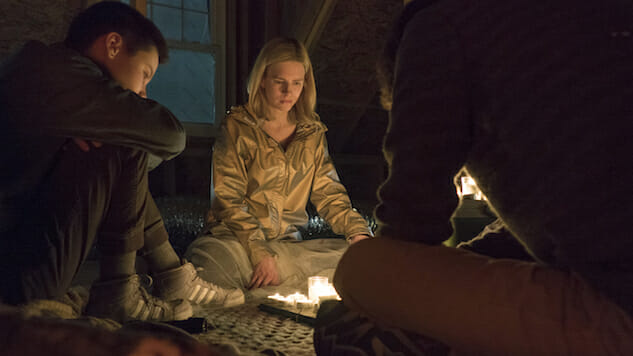How Netflix’s The OA Crafts Sci-Fi’s Spiritual Counterpart
Myles Aronowitz/Netflix

“Homecoming,” the first episode of Netflix’s nettlesome sci-fi experiment, The OA, holds the series’ stories at arm’s length. When Prairie Johnson (Brit Marling) plunges from a bridge in the opening sequence—a dramatic act that remains unexplained—the mystery she sets in motion seems designed to frustrate, to withhold: Her initial refusal to describe what happened during the seven years she went missing, seven years in which she lost herself but regained her sight, does not so much create suspense as test one’s patience. With her adoptive parents, Nancy (Alice Krige) and Abel (Scott Wilson), as with investigators, Prairie is willfully cryptic, maddeningly opaque, though her most baffling pronouncement turns out, in the end, to be true: “We died more times than I can count.”
In this, The OA, which Marling created and wrote with her frequent collaborator, director Zal Batmanglij, reflects its central conceit, by which Prairie, calling herself “the OA,” relates her life story for four high school students and one teacher on the upper floor of an unfinished home in a suburban Michigan subdivision. The series asks its audience, as the OA does hers, for trust, to the point that the suspension of disbelief emerges as the subject of The OA, and not merely its mechanism. That each installment concludes with images of the listeners’ rapt faces might appear premature, given the series’ own meandering course, and yet, mirroring the OA’s inscrutable message, Marling and Batmanglij’s snarled stories ultimately straighten, as if diagramming an indecipherable sentence or lining a complex hymn. When its nesting narratives come taut, when its forked paths converge, The OA rewards the faith it requires, crafting an extraordinary analogue to sci-fi: spiritual fiction.
It is nonetheless difficult to “recommend” The OA, to urge you to watch it, for its ungainliness demands attention it earns only in retrospect; as with other streaming dramas, much of the first season is a form of throat-clearing, time spent finding itself under the guise of necessary exposition. Indeed, the series announces its intention to tax us near the conclusion of “Homecoming,” when, 57 minutes into the episode, the title card appears, as the OA launches into reminiscences of her Russian childhood and the score sends us soaring over snowy Moscow. Against each haunting moment, then—the sight of a young girl’s motionless body, framed in a ray of light; the decisive click of a locked door; a prisoner’s mournful dirge—the series levies long, shiftless stretches that strain to obscure the sharp turns in its narrative. It depends, instead, on our willingness to accept the OA’s promise of a horizon line we cannot see: “I need to cross a border that’s hard to define,” she says in a self-recorded video, inviting the curious to hear her out. “Maybe you know what I’m talking about. Or you don’t, but you feel it.”
-

-

-

-

-

-

-

-

-

-

-

-

-

-

-

-

-

-

-

-

-

-

-

-

-

-

-

-

-

-

-

-

-

-

-

-

-

-

-

-








































